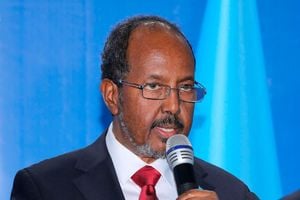
Tanzania’s President Samia Suluhu Hassan (left) shakes hands with her Somalian counterpart Hassan Sheikh Mohamud during the EAC summit in Arusha, Tanzania on November 24, 2023. PHOTO | POOL
Somalia may count itself successful, or not, in 2023, depending on who you ask.
The country’s President Hassan Sheikh Mohamud has admitted the wins on the international front have, sort of, been dampened by a sluggish push at home.
Three things happened from the end of November: Somalia joined the East African Community, becoming the eigth member.
Then it got its 31-year-old arms embargo imposed by the UN Security Council lifted. This was shortly followed by a debt relief announced by the World Bank and the International Monetary Fund (IMF), allowing Mogadishu to start negotiating new credit lines with international lenders.
“When you are indebted, you either pay or get a relief,” Mohamud said in Washington on December 13, after the decision. The negotiations for debt relief lasted a decade.
President Mohamud had told a joint session of parliament on November 25 that Somalia’s aim for 2023 was to achieve all the three goals. But, overall, he said, Mogadishu wanted to achieve “five major milestones,” three dependents on international partners and two based on national efforts.
“The two milestones dependent on local efforts, including the complete revision and implementation of the interim constitution and the efforts to defeat the extremist groups (al-Shabaab and Islamic State of Somalia) seem difficult to achieve,” the president told the lawmakers. “
Look at how generous the international community is to us by approving our requests while we are lousy at tackling our own tasks, like fixing our social contract to guide our nation and alleviate the burden on us imposed by terrorists.”
The constitution remaking has been in paralysis for nearly two decades.
The review started in Djibouti in 2000, when a major reconciliation conference was initiated in Arta town, where hundreds of Somali delegates, mainly from the civil society, converged.
A major document, the Transitional National Charter, was produced in August 2000 leading to the election of Somalia’s fifth president, Abdikasim Salad Hassan, who formed the Transitional National Government.
A more inclusive reconciliation conference was held at Eldoret and Mbagathi in Nairobi, Kenya, between 2002 and 2004, producing an improved document, the Transitional Federal Charter.
The charter was voted in Mogadishu to become a Transitional Federal Constitution in 2012 by over 800 delegates selected from Somali clans.
It remains in use to date, in spite of gaps that have seen Mogadishu at times in dispute with federal states.
On Thursday, Somali Prime Minister Hamza Abdi Barre pledged that his Dan-Qaran (National Interest) government will spare no energy to ensure that the constitution is reviewed and completed.
“My government will make sure that the constitution duly reviewed and passes through all the required institutions for implementation,” PM Barre said.






